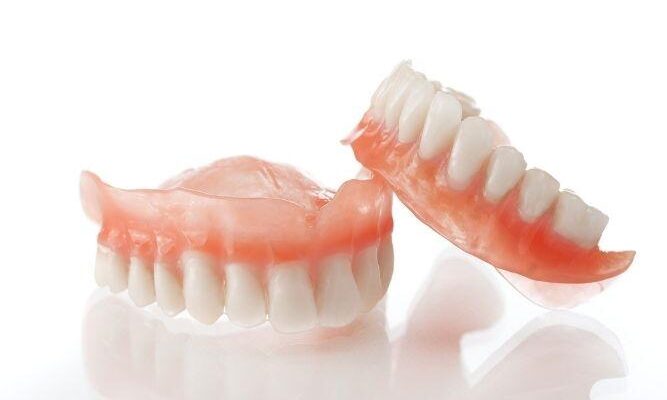Dentures can help improve your oral health in a number of ways. They enhance chewing (and digestion), support your facial muscles, improve your speech, and give you back your smile.
If you’ve been missing teeth for quite some time, you might be concerned that you can no longer get dentures. There’s good news – in almost all cases, dentures are a practical solution, even if you’ve been missing your teeth for a long time. You should know, however, that dentures can become more expensive and less practical the longer your teeth have been missing for. That means it’s always best to get dentures sooner rather than later.
Why is it best to get dentures as early as possible? What kinds of dentures are available, and what’s best for people who have been missing their teeth for a long time? We’re going to answer all of these questions and more – read on.
Missing teeth and jaw bone loss
We want to avoid getting too technical in this article, but a little science will go a long way in explaining why it’s important to get dentures early.
Throughout your life, you’ll lose and gain bone density throughout your skeleton. Most of the time, this bone loss (resorption) and the addition of new bone (ossification) happen in almost picture-perfect balance, with little to no total bone being lost in the process. In fact, the process is essential, as it ensures that you have strong, healthy bones.
When you’re missing teeth, however, the ossification process is hampered. Ossification in your jaw is triggered by chewing and biting – when those processes stop (because you’re missing teeth), you’ll lose bone mass through resorption but won’t gain any through ossification.
This can affect your ability to get certain types of dentures – more specifically, full dentures which require implants. Fortunately, not all full dentures need implants – let’s take a look at a few of the main categories of dentures to get a better idea.
The different types of dentures
There are two main categories of dentures: Full (or complete) dentures and partial dentures.
Full dentures are for patients who are missing a whole set of teeth (top, bottom, or both). There are two kinds of full dentures we want to discuss today: Suction dentures and snap-in dentures.
Snap-in dentures are attached to dental implants designed to hold them. Dental implants designed to hold snap-in are placed in a patient’s mouth during a surgical procedure in which they are rooted into the jawbone. That means for implants to be placed (and for snap-in dentures to be a realistic possibility), a patient needs a strong and healthy jawbone. This is one of the major reasons that it’s best to get dentures as soon as possible. Snap-in dentures last longer and tend to provide a better, more natural feel for patients.
Suction dentures, on the other hand, can be used even when patients have experienced severe bone loss. That’s because they don’t rely on implants – they use pretty clever suction mechanics to fit perfectly over a patient’s gums while still being easy to remove.
Partial dentures are viable if a patient has healthy teeth. Typically, they’ll be used if you’re missing three or more teeth, but your other teeth are healthy. Even if a patient is missing one tooth, small partial dentures can be a great solution for esthetics, function, and also economical alternative to a bridge or an implant with a crown.The partials can be attached with clasps to your healthy teeth.
Bone grafting and dental implants
What if you want snap-in dentures, but you don’t have enough healthy jawbone for the necessary implants? There’s another option: Bone grafting. With bone grafting surgery, you can restore your jawbone. The process, however, is quite complex. It can involve taking bone from another part of your body or from another source. From there, it takes months for the bone to be ready for an implant.
When the bone is taken from a secondary source (not from your body), the surgery usually doesn’t require a general anaesthetic or a hospital stay. When it’s taken from your body, however, general anaesthetic and a hospital stay may both be required.
This means that not every patient is a good candidate for bone graft surgery – and it’s always best to avoid surgery if you can. That’s why it’s a good idea to get dentures before your jawbone starts to resorb! Best of all, implants can slow the resorption process.
Denture relining
Now you’ve got a solid idea of why it’s important to get dentures early. But with all this talk of resorption, we thought this would be a good time to talk about something that’s important for full and partial dentures: Denture relining.
Even in best-case scenarios, resorption tends to beat out ossification as you get older – that means you’ll probably see some bone loss, even if you’re taking great care of any remaining teeth, any implants you may have, and your dentures. This can lead to your existing dentures losing their comfortable fit.
Relining adds thickness to your dentures to make up for the space created by bone loss. It’s something almost every denture wearer will need after some time – and it’s a relatively simple and quick process that will keep you from having to buy new dentures before you need to.
Need dentures? Call Borbely Swiss today!
Our Winnipeg dentures are custom-made to fit your mouth perfectly – and we can help you whether you’ve just lost your teeth or you haven’t had teeth for years. Our goal is to improve our patients’ lives, no matter what their oral health history may be – so call us today!
We hope this article has helped you understand the options available to you. When it comes to dentures, there’s a solution for everyone!

